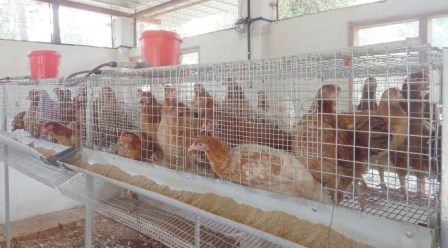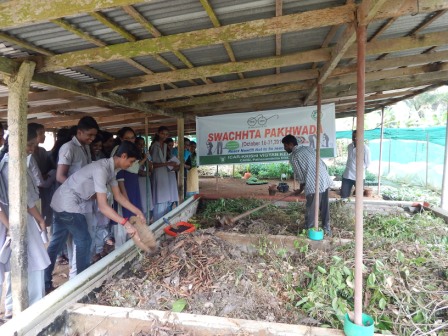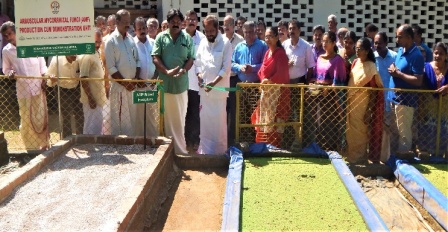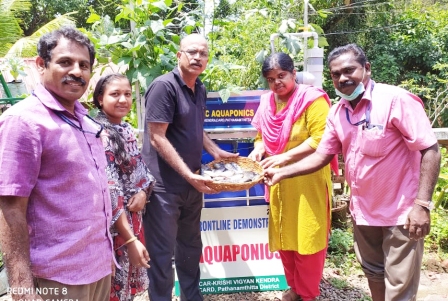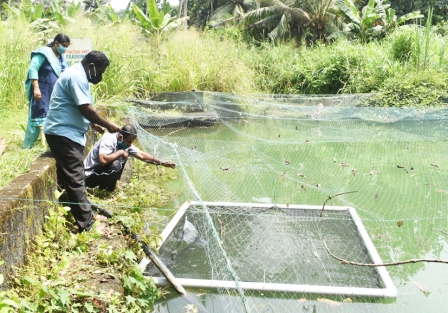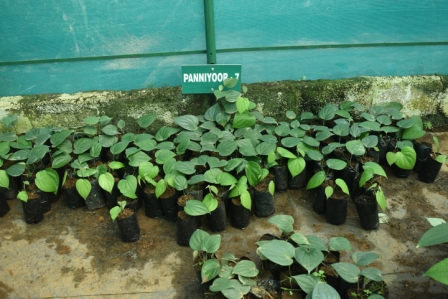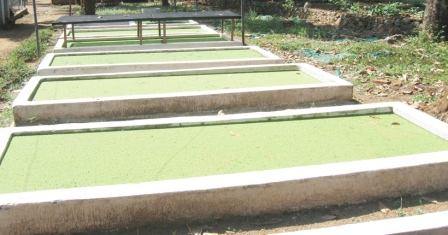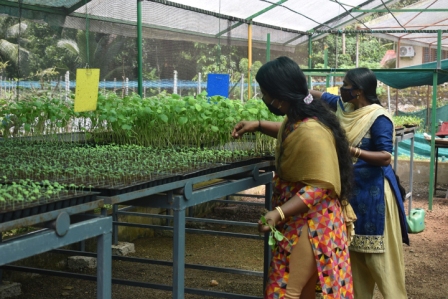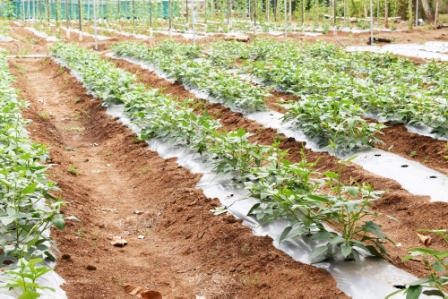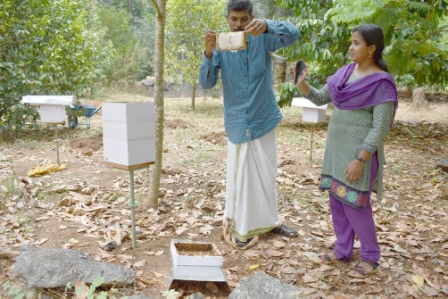FARM
KVK has a well-established instructional farm that produces quality planting materials of fruit trees (indigenous and exotic), spices, tuber crops, coconut, ornamentals, medicinal plants, etc. The progeny orchard of exotic fruits (rambutan, mangosteen, pulasan, and durian) and indigenous plants (mango, jackfruit, nutmeg, etc.) is a unique model, established with the support of Pathanamthitta District Panchayath.
The instructional farm has the following demonstration units
Goat unit
The goat unit of KVK demonstrates the different rearing methods of goats. KVK maintains Jamunapari and Malabari crossbred does at KVK farm. After extensive training on scientific goat rearing and management at KVK, the kids are supplied to the farmers.
Poultry and Egger nursery unit:
KVK has three egger nursery units with a rearing capacity of 2000 Poultry chicks in one lot. These egger nurseries demonstrate the technologies related to the field. Different improved varieties of poultry birds such as Grama Sree, B.V 380 and indigenous varieties such as Kadaknath, Assel, Naked neck, and Nagaland locals are demonstrated and distributed among the farmers at consistent intervals.
Apiculture
KVK maintains the beehives of Indian bee and Dammer Bee to demonstrate its potential as a subsidiary income generation activity, which are alsoan effective pollinator in vegetable production.
Vermicomposting unit
A vermicomposting unit is maintained at KVK to demonstrate the composting techniques using Eisenia fetida and Eudrilus Eugenia.
These worms convert organic waste to high value vermicomposting in 60 days.The different types of vermicomposting method are
Tank Method
Muchetty
Vermibed technique using Sirpauline sheet
Zero energy cool chamber
This model developed by IARI is demonstrated in KVK farm, that holds the potential to store the vegetable and fruits for quite some times in a specified temperature range for a particular crop. This is widely popularized to store vegetables in electricity inaccessible areas for a longer duration.
Arbuscular Mycorrhizal Fungi (AMF) production cum demonstration unit
As part of the project GAP based advisory for crop health management in Pathanamthitta District (2019-20) funded by Dept. of Agriculture Development and Farmers’ Welfare, Govt. of Kerala, an Arbuscular Mycorrhizal Fungi (AMF) production cum demonstration unit has been established with the potential AMF mother-cultures from Dept. of Microbiology, CoA, Kerala Agricultural University, Vellayani. The strains include Glomus etunicatum, Glomus mosseae, Glomus fasciculatum, Gigasporasps.
The unit provides farmers to access potential AMF inoculants to incorporate in Integrated Soil Fertility Management practices to improve crop production.The Micorrhizal innoculam can also be potentially in nurseries.
Nursery
Nursery attached to KVK farm produces and makes available the planting materials required for the farmers. Quality vegetable seedlings such as brinjal, chilly, tomato, cabbage, cauliflower, palak, and grafted tomato seedlings are produced and distributed among farming community.
Our Production Specialities
- Planting materials of fruit plants
- Budded plants of mango, jackfruit, rambutan, pulasan, guava
- Seedling production of lime, lemon, lovelovi, mangosteen, Bilimbi.
- Spices crops like budded nutmeg, seedlings of allspice, clove, gamboge, curry leaf pepper varieties, turmeric and ginger varieties.
- Seedlings of WCT, COD and CGD varieties.
- Different Ornamental plants and medicinal plants.
To ensure the availability of quality planting material of Jack fruit, the State Resource Centre for Jack fruit managed by the KVK established an exclusive jackfruit nursery for the production of budded plants of Jackfruit. Instead of the traditional poly bag grown plants, the nursery practices root trainer rootstalk production for ensuring the production of high-quality bud grafts of Jackfruit. Location specificity proven varieties, such as Thean Varikka, Gumless Jack, Rose Varikka, and Chembarathy Varikka, are produced in the nursery.
Exotic Fruit Plant Orchard and scion bank
KVK has exotic fruit plant orchard and scion bank in an area of 4.25 ha.This enables the farmers to get quality planting materials of exotic fruits Plants (Rambutan, Pulasan, Durian, Mangosteen, etc.) from KVK Nursery. KVK also has a collection of different local varieties of Mango, Nutmeg, jackfruits etc.
Aquaponics:
Domestic aquaponics is the best solution for growing vegetables and fishes, in peri-urban or urban areas, with limited space and water. Under the Aquaponics system, 1m3area is set aside for fish farming while 3sq.m is kept for soil-less vegetable cultivation where green leafy and fruiting vegetables (tomato, bhindi, brinjal, etc.) can be cultivated.
Fisheries
Common carps (viz. Rohu, Catla, Mrigal, Amur) suitable for freshwater aquaculture is demonstrated at KVK in two ponds of 3.5 and 7 cents each. Apart from this, technologies suitable for natural ponds and quarry ponds such as cage fish farming are also present at the KVK farm. The Performance of Genetically Improved Fish Tilapia (GIFT) in cages of 6m3 as per the cage farming aquaculture technology is demonstrated in the natural ponds.
Herbal Garden:
Herbal garden is maintained at KVK for creating awareness about the importance and medicinal use of herbal plants among the public of the Pathanamthitta district. The main attraction of the herbal garden is the ‘Nakshatra Vanam’ based on Indian astrology. This goes a long way toward biodiversity conservation. The unit aims to promote the concept of ‘A herbal garden in every home’.
Pepper rapid multiplication unit: KVK maintains a pepper multiplication unit where two types of techniques are demonstrated.
The serpentine layer method
Column method. Sixteen types of pepper varieties are multiplied and made available to the farmer of the district.
Coconut nursery:
KVK maintains coconut nursery of WCT (Elite palms), Chawakad green dwarf, and Chawakad yellow dwarf producing about 15000 seedlings annually and distributed to the farmers.
Fodder demonstration unit:
Fodder varieties of Hybrid Napier –Co3, Co4 and Co5 are demonstrated in the farm. The slips of these varieties are also supplied to farmers for larger multiplication.
Azolla
Azolla (Azolla pinnata) which is largely used as feed for poultry and livestock are demonstrated and seed materials for multiplication and production are made available to farmers.
High-tech vegetable seedling production Nursery
The unit which is established under the ARYA project has production capacity of 1,00,000 seedlings/year. Hybrid seedlings of tomato, brinjal, chilli, cabbage, cauliflower, and grafted seedlings of tomato, brinjal and chill are produced in the unit using protray technology.
Drip – Fertigation Unit
This units serve to demonstrate the various components of the drip irrigation unit, methodology of fertigation and use of plastic mulching. They aim in enhancing productivity and profitability in vegetable cultivation. Crops such as Yard Long Bean, Bitter gourd, Snake gourd, Chilli, Bush cowpea, Okra and Cabbage are regularly cultivated in the unit, using the advanced production technologies.
Ultra-High Density Vegetable Production Unit (UHDVPU)
The unit demonstrates the cultivation of vegetables in rain shelter for home consumption. The components of UHDVPU includes:
- A portable rain shelter of size 6m x 3m (area -18 sq.m)
- 60 grow bags
- A low-cost bucket drip irrigation unit
- A fertigation facility.
A unique crop calendar is also providedthat gives various crop options for cultivation in the unit. It can produce an average of 700g. safe to eat and fresh vegetables per day.
Mushroom Unit:
The Mushroom unit in an area of 200 sqft demonstrate production of oyster and milky mushroom.
Apiculture
The apiculture unit of KVK displays the Dammer Bee and Indian Bee rearing. It is for the hands-on training given on the different aspects of bee rearing.
